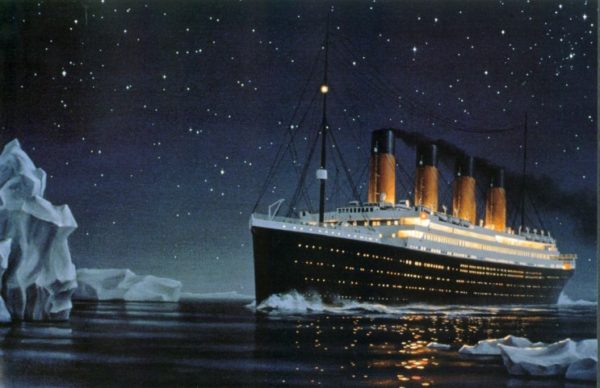Steering Away From The Iceberg
Generation X grew up under the shadow of doom: we recognized that our society, as designed, was headed for collapse and that the Baby Boomers had taken everything good for themselves and then set a timer to destroy it so that others could not have it.
This created an apocalyptic generation, aware of the inevitability of its doom and the certainty that it would not live the blessed life that previous generations had experienced. For one thing, wages began stagnating when women entered the workforce; for another, new rules and mandatory education made it hard to rise without the right credentials, keeping the most competent out and ensuring that every office was run by over-qualified nitwits.
In addition, social decay had taken hold. Sexual liberation meant that one never found an innocent spouse, but a jaded one, unlikely to stay married. Diversity meant ruined cities and a manic need for money to escape the ever-advancing decay. Equality meant that every product would be the lowest common denominator, every election a defeat, and social interaction a matter of dodging morons to find time alone.
We were doomed and we knew it.
Our musical choices reflected that. Perhaps the most telling symbol came from this metaphor for decay:
Those who came before us had sabotaged us. They set us up to fail and ruined what we would inherit. Then they blamed us for being “lazy,” as if the same rules that applies fifty years prior somehow applied to our careers, after regulations, lawsuits, affirmative action, a female workforce and the power of academia shattered our own prospects. They wanted us to fail so they could conclude the problem was within our generation and not the actions of the generation prior.
The metaphor comes alive in this moment:
You’re scheming on a thing that’s a mirage
I’m trying to tell you now it’s sabotage
Why; our backs are now against the wall
Listen all of y’all it’s a sabotage
Most good music is metaphorical, both so the artists avoid retribution and because communicating a spirit and pattern is more flexible and effective than arguing with people. Metaphor brings out the feeling of an age and the sensations of a generation which they perceive but cannot yet articulate. Songs give them a reference point to discover years later.
Another:
This is a song of frustration. It seems both metaphorical and literal in that many of the acts it threatens are not intended at all to be carried out by the musicians, but are expressive of their frustration; at the same time, it appears addressed at the world at large. The point is that all actions in this new world will fail because other people hold the strings, and they are oblivious to noticing reality.
We don’t care, it’s not our fault that we were born too late
A screaming headache on the brow of the state
Killing time is appropriate…Now I know what is right
I’ll kill them all if I like
I’m a time bomb inside
No one listens to reason,
It’s too late and I’m ready to fight!
Born too late? No one listens to reason? Sounds entirely like the 1980s: when the time bombs of Leftist 1960s policy and 1930s social changes came home to roost and essentially ruined everything good. The fundamental change of the USA from a WASP-oriented, conservative society to an inclusive and standards-free place resulted in the creation of a unique hell, which accelerated the police state around us as social order imploded.
But while the edgy kids listened to Ministry, those who were more seriously ready to drop out and get the heck away from the lit fuse were listening to Slayer:
It even sounded epic, like the cathedrals and battles of yore. Couched as a song about judgment day, it uncannily described the environment we grew up in. Social order had failed, the end was near, and judgment was at hand if not by God, by our own actions. In a crisis, people divide into those who can face the crisis, as we see in horror films as a trope of the genre, versus those who go into denial. This was an anthem against the pathology of the Baby Boomers, oblivious self-congratulatory denial.
Bastard sons begat your cunting daughters,
Promiscuous mothers with your incestuous fathers.
Ingrate souls condemned for all eternity,
Obtained by immoral observance a domineering deity.Chaos rampant,
An age of distrust.
Confrontations.
Impulsive sabbath.
This was the music that came after the wistful and romantic pop of the 1980s, in which instead of commenting on the decay or longing for something better, we confronted the hard fact: the good guys lost and the bad guys won, and in the resulting society, idiots and jerks would always win. Decay was not a risk, but a reality. The apocalypse was now.
Where in the past people had the chance to steer Titanic away from the iceberg, now the course was set. Anyone who rushed to the bridge and demanded a change in course would be branded a heretic or fool and destroyed. And the ship would churn onward, guided by the addiction to illusion that was necessary for the Baby Boomers to feel good about themselves, which seemed to be all they cared about.
At this point, the gash is in the side of the ship and water is rushing in. We cannot stop it from going down, but we can plan our next destination. We have lifeboats and if we are sane, we will load those who noticed the decline into them and let them set up a new civilization, then let the others sink with the ship and clear aside the wreckage to start anew.
Tags: 1980s, apocalypse, baby boomers, civilization collapse










